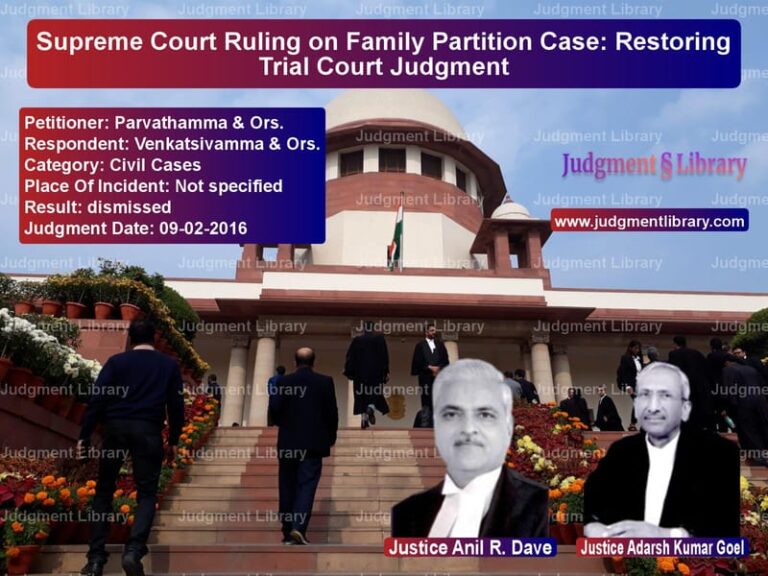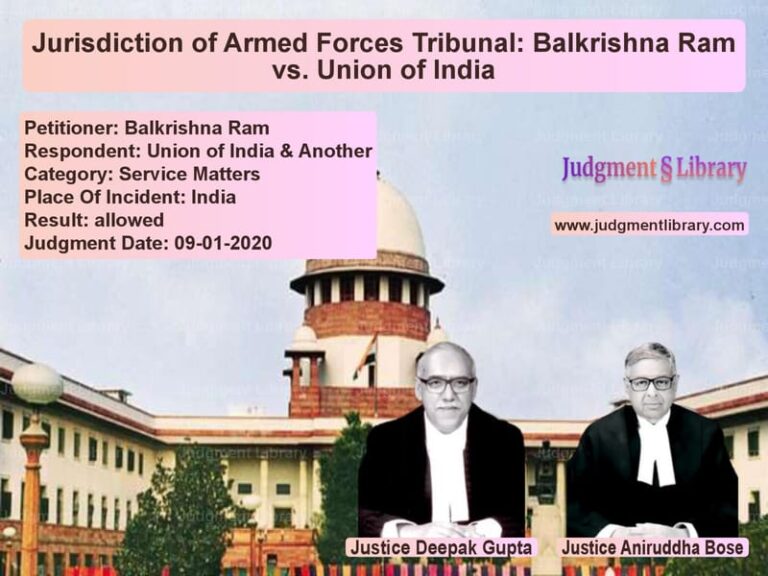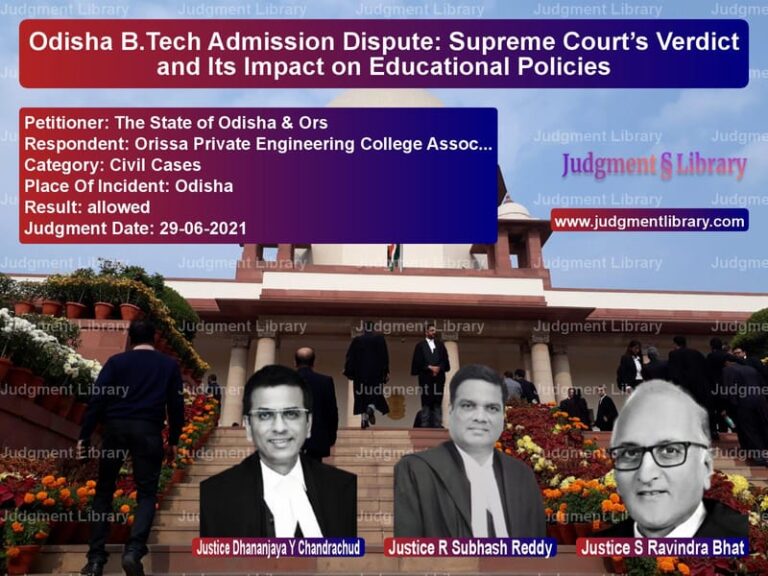Supreme Court Quashes FIR Against Army Officers Under AFSPA in Nagaland Operation
The case of Rabina Ghale & Anr. vs. Union of India & Ors. and Anjali Gupta vs. Union of India & Ors. deals with the Supreme Court’s decision to quash FIRs filed against personnel of the 21 PARA (SF) Unit of the Indian Army over an operation in Nagaland. The ruling was based on the protection granted under the Armed Forces (Special Powers) Act, 1958 (AFSPA), which requires prior sanction from the Central Government before prosecuting military personnel.
The judgment provides clarity on the legal immunity of army personnel operating in disturbed areas and reinforces the importance of following due process before initiating criminal proceedings against them.
Background of the Case
The petitioners, Rabina Ghale and Anjali Gupta, are the wives of army officers who were part of an operation conducted by the 21 PARA (SF) unit in Mon District, Nagaland, on December 4, 2021. During this operation:
- Army personnel fired upon a group of civilians, resulting in the death of six individuals.
- The incident led to retaliation from local residents, causing further casualties, including the death of Paratrooper Gautam Lal.
- The Nagaland police filed an FIR under Sections 302, 307, 326, 201, 34, and 120-B IPC against the army personnel involved.
- A Special Investigation Team (SIT) was formed, which recommended prosecution and disciplinary action against the officers.
The petitioners approached the Supreme Court, arguing that their husbands and other army personnel were being unfairly targeted for performing their duties and that no prior sanction had been obtained under AFSPA.
Legal Arguments
Arguments by the Petitioners (Rabina Ghale & Anjali Gupta)
- The FIR and subsequent investigation were illegal as no sanction was obtained under Section 6 of AFSPA, which is mandatory for prosecuting army personnel.
- The army officers acted in good faith while carrying out an operation sanctioned by the central government.
- The incident was misrepresented by local authorities to falsely implicate army personnel.
- The case set a dangerous precedent, putting soldiers at risk of prosecution for executing military operations in disturbed areas.
Arguments by the Respondents (Union of India & Nagaland Government)
- The State of Nagaland argued that the police had sufficient grounds to investigate the army officers for alleged misuse of force.
- The Special Investigation Team (SIT) found evidence that army personnel had acted beyond their operational mandate.
- The police had sought permission from the Central Government to prosecute, but the Ministry of Defence refused to grant sanction on February 28, 2023.
- The state government insisted that the proceedings should continue, subject to a review of the sanction refusal.
Supreme Court’s Observations
The Supreme Court examined the applicability of AFSPA and the legal procedures involved in prosecuting army personnel for actions taken in the course of duty.
1. Does AFSPA Provide Immunity to Army Personnel?
The Court reaffirmed that Section 6 of AFSPA explicitly bars the prosecution of army personnel without prior sanction from the Central Government.
“No prosecution, suit, or other legal proceedings shall be instituted except with the previous sanction of the Central Government, against any person in respect of anything done or purported to be done in exercise of the powers conferred by this Act.”
2. Did the SIT Have Authority to Investigate the Army Officers?
The Court held that while the SIT could conduct an investigation, it had no power to prosecute without prior approval from the Central Government. The findings of the SIT were, therefore, unenforceable without sanction.
3. Can the Case Proceed Without Sanction?
Since the Ministry of Defence had already denied sanction, the Court ruled that the FIRs and related proceedings could not continue.
Final Verdict
The Supreme Court issued the following orders:
- The FIRs filed against the army personnel were quashed.
- The Nagaland police and SIT were barred from taking further action against the army officers.
- However, the Court clarified that if sanction is granted in the future, the case could be reopened as per legal provisions.
This ruling reinforces the protection provided to the armed forces under AFSPA and ensures that military personnel are not subjected to legal proceedings without proper authorization.
Petitioner Name: Rabina Ghale & Anr., Anjali Gupta.Respondent Name: Union of India & Ors..Judgment By: Justice Vikram Nath, Justice Prasanna Bhalachandra Varale.Place Of Incident: Mon District, Nagaland.Judgment Date: 17-09-2024.
Don’t miss out on the full details! Download the complete judgment in PDF format below and gain valuable insights instantly!
Download Judgment: rabina-ghale-&-anr.,-vs-union-of-india-&-ors-supreme-court-of-india-judgment-dated-17-09-2024.pdf
Directly Download Judgment: Directly download this Judgment
See all petitions in Custodial Deaths and Police Misconduct
See all petitions in Bail and Anticipatory Bail
See all petitions in Contempt Of Court cases
See all petitions in Judgment by Vikram Nath
See all petitions in Judgment by Prasanna Bhalachandra Varale
See all petitions in allowed
See all petitions in Quashed
See all petitions in supreme court of India judgments September 2024
See all petitions in 2024 judgments
See all posts in Criminal Cases Category
See all allowed petitions in Criminal Cases Category
See all Dismissed petitions in Criminal Cases Category
See all partially allowed petitions in Criminal Cases Category







